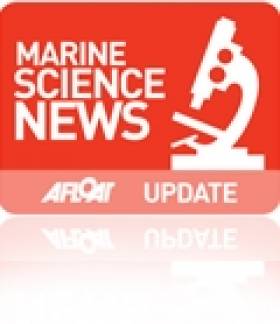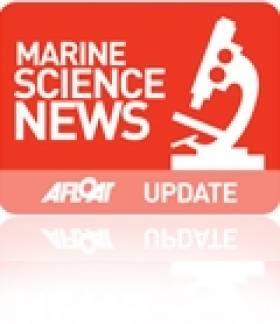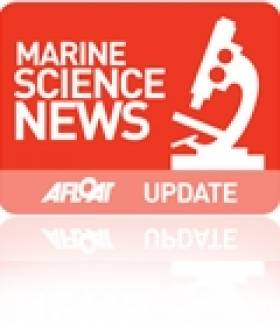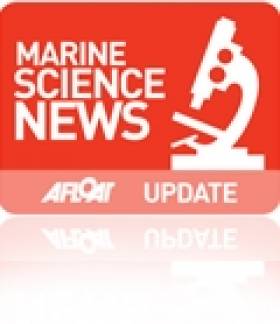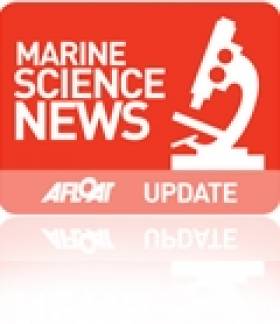Displaying items by tag: RV
#marinescience – Minister of State with responsibility for Natural Resources at the Department of Communications, Energy & Natural Resources, Joe McHugh T.D., today formally commissioned the INFOMAR Programme's new survey vessel, naming her the RV TONN at the Poolbeg Yacht, Boat Club & Marina.
As part of Ireland's national marine mapping initiative, the INFOMAR programme carries out hydrographic & geophysical surveys of Irish territorial waters. It is a cooperative programme between the Geological Survey of Ireland and the Marine Institute and is funded by the Department of Communications, Energy and Natural Resources.
Minister McHugh said "The INFOMAR programme is unique among the various projects funded by my Department, DCENR, in that, for 6 - 8 months of the year, the Infomar team of marine survey specialists live and work among the Irish coastal communities around the entire coast of Ireland." The Minister went on to say one of the achievements of the INFOMAR programme is the focus on disseminating new information on the Irish offshore, which is available free on the http://www.infomar.ie/data/ website. The Minster added "A really good example of the applied use of INFOMAR data is the smartphone App produced jointly by the Irish Underwater Council and INFOMAR, which affords a user access to The Wild Atlantic Way/Dive & Snorkelling sample locations.
The RV Tonn, is named appropriately after the Irish for wave, as it both operates on the waves and uses sound waves to investigate the depth and nature of the seabed. It is a new state of the art vessel, only 8 metres in length, but purpose built to carry out very shallow survey work. It was built by Cheetah Marine in the Isle of Wight after an open tender process.
This new vessel, RV Tonn, will support the completion of the first phase of the Infomar Project's mapping of three priority Areas and 26 priority bays, by the end of 2015.
Welcoming the launch, Koen Verbruggen, Director of the Geological Survey of Ireland, said "Up-to-date advanced mapping, facilitates greater awareness of Irish marine opportunities."
The Stagiaire position is an excellent training opportunity for a recent graduate. The position will be based in Galway. For further information on description of the position, duration of contract and how to apply click HERE and note that the closing date is 12 noon on Friday 5th August 2011.
- Marine Institute
- marine science
- Research Vessels
- RV
- Marine Science News
- Marine Institute vacancies
- Marine vacancies
- Irish marine vacancies
- Irish marine careers
- Marine Institute Stagiaire Programme
- Marine Institute Oranmore
- Irish marine science news
- RV operations
- Jobs and Careers
- Irish marine jobs and careers
- Jobs and careers news
Waterford: Where Tallships and Science Meet
This was the RV Keary's first INFOMAR survey leg of 2011 and it was also the first time that both vessels have worked in tandem. The mapping of the estuary was from an area just west of the city's Rice Bridge to the open sea at the mouth of Waterford Harbour.
The estuary was mapped before in 2007 using the Marine Institutes larger vessel the RV Celtic Voyager, which covered the harbour approaches from the 10m contour to greater depth offshore. Both RV Keary and RV Geo overlapped their coverage with this previous data, producing a comprehensive and seamless seabed map of the area.
RV Keary is constructed of marine grade aluminium and was custom built in 2008 for the (GSI) by Veecraft Marine of Capetown, South Africa.
The 15m craft with a draft of just 2m is equipped with an extensive range of highly sophisticated technology. She has an open working area at the aft-deck to conduct operations and is licensed to carry up to 12 personnel. For further vessel characteristics click HERE.
The 34-tonne craft made her 7,000 mile delivery voyage from the African continent to Europe. She was firstly transported on the deck of a cargoship to Rotterdam. After unloading at the Dutch port the 22-knot capable craft set off with several calls along the UK south coast to include loading bunkers before finally reaching Dun Laoghaire, from where she entered service in April 2009.
'The Sea: One of Ireland's Greatest Natural Resources' - Coveney
The Minister was speaking during a visit to the Marine Institute's research vessel, RV Celtic Explorer, on its return from a mission to the Labrador and Newfoundland Seas.
He added "I am particularly pleased that this is my first official engagement as Minister for Agriculture, Marine and Food. The work of the RV Celtic Explorer highlights the essential nature of marine research, development and sustainable management, through which Ireland is developing a strong and well-deserved reputation as an emerging centre of excellence, where we have prominent roles in many European and international marine science bodies."
Minister Coveney commended the Marine Institute and its Chief Executive, Dr Peter Heffernan, for its leading and proactive role in the areas of fisheries science, marine environment and food safety as well as ocean science and said that he looked forward to working closely with the Institute and benefitting from the research and advice which they would undertake and provide.
The Minister noted that Ireland's two national research vessels – RV Celtic Explorer and RV Celtic Voyager – will record 267 days at sea during 2011, during which they will be engaged in fisheries surveys, underwater mapping, climate studies and deepwater surveys.
Seeing the capabilities of Ireland's largest research vessel and the work of the Marine Institute, Mr Simon Coveney highlighted the importance the Marine Sector has on the Irish economy. "The seas and ocean that surround the land of Ireland is arguably one of our countries greatest natural resources. Through marine research, development and sustainable management, Ireland is developing a strong reputation as an emerging centre of excellence, where we have prominent roles in many European and international marine science bodies," he said.
Ireland's national research vessels RV Celtic Explorer and RV Celtic Voyager will record 627 days at sea between the two during 2011. Their work will range from fisheries surveys to underwater mapping and from climate studies to deepwater surveys with the remotely operated submersible ROV Holland 1.
"The work conducted on the vessels continues to feed into the success in attracting EU funding to Ireland's marine science programmes that have been achieved by our strategic approach to marine science planning" explained Dr Peter Heffernan, CEO of the Marine Institute.
"The award of funding projects shows that partnerships between academics and small businesses can yield significant dividends in creating jobs, generating economic revenue and the supply of raw materials for new industries ranging from ocean energy and environmental monitoring technologies to marine-inspired pharmaceuticals and food ingredients" he further said.
Irish to Lead Europe in Research Vessel Productivity
These figures compare favourably with our European counterparts, reflecting a high level of activity on national and international research and monitoring programmes.
Work duties in 2011 for the Galway based vessels will range from fisheries surveys to underwater mapping and from climate studies to deepwater surveys with the remotely operated submersible ROV Holland 1. The work schedule will facilitate training missions and to carry out essential maintenance work on Ireland's network of data buoys that, in parallel to their research function, supply the vital information on which weather and shipping forecasts are based.
The increased activity of the research vessels reflects the growing imperative to understand and sustainably manage the economic potential of our offshore marine territories, an area over ten times that of Ireland itself.
A major role of the ships' workload will be commercial fish stock assessments. Together they are to devote 141 days on stock surveys in support of the sustainable management of Ireland's fisheries.
The RV Celtic Voyager will conduct underwater television surveys of valuable prawn stocks off the Aran Islands, the Irish and Celtic Seas, working on blue whiting, a survey of herring stocks in the north-west. In addition a comprehensive 54-day annual Irish Groundfish Survey which will take place in stages all around the Irish coast from September to December.
The survey will be the largest undertaken by an Irish research vessel and is essential to providing the scientific data used to inform the annual quota negotiations required in Brussels each year.
For the 2011 schedule for both vessels is available to view by clicking HERE and the Maritime Institute website click this link.
At 65.5m RV Celtic Explorer (2,425grt) accommodates 35 personnel and up to 21 scientists and 31.4m RV Celtic Voyager (340grt) with up to 8 scientists and a maximum endurance of 14-day days. For detailed technical specifications of the Dutch built vessels, RV Celtic Explorer, click here to download a PDF file and for the RV Celtic Voyager click here
For further information contact: Dr John Joyce, Communications Manager of Marine Institute on 087 2250871


























